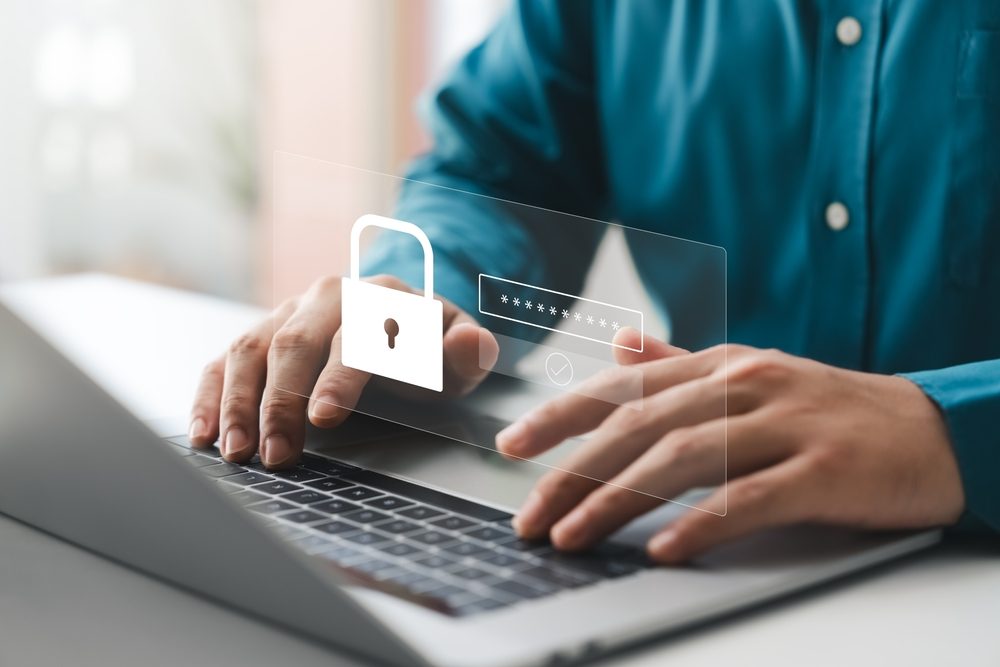Did you know that college students spend 3-4 hours/day on online homework and research? It accounts for more time spent on academic tasks than on recreational activities (i.e., 1-2 hours/day).
There’s also the fact that 61% (9.4 million) of undergraduates were enrolled in at least one online course. Of these students, 28% (4.4 million) took online courses exclusively (NCES, Fall 2021).
These numbers prove the growing use of online learning platforms among college students. But along with it comes the increase in student data tracking.
This is where issues in data privacy in online education come in. These include personal information leaks and misuse of learning analytics. Students are at risk of unauthorized analysis of their habits, performance, and behavior.
Fortunately, you can adapt effective online college data security measures to protect yourself. Being aware and proactive is a must to safeguard your digital privacy.
Related:
- Laptop Tips and Tricks for Online College Students
- Accredited Online Colleges That Accept FAFSA
- Easy Online College Programs for Undergrads
- Community College Transfer to Accredited Engineering Program
- Accredited Online Colleges Offering a Free Laptop or Discounted Laptop (2025 Guide)
What Data Is Collected in Online Colleges

Student data collection online has become more widespread across colleges and universities. The methods of collection include LMS tracking, remote proctoring tools, and communication logs.
But while it has its uses, it raises concerns about learning analytics privacy. The first concern is the types of data collected, and then who has access to it and how it is used or shared.
Types of Data Collected
Colleges and universities collect a wide range of data for their future use.
- Personal identifiable information (PII) to create student profiles and manage online access:
- Name, age, date of birth, and gender
- Contact details
- Email address
- Government-issued IDs
- Academic performance data to assess student academic performance and progress
- Tests and assignments
- Scores and grades
- Feedback
- Behavioral and learning analytics to track platform engagement and learning habits
- Clicks
- Tasks
- Engagement (e.g., discussions and threads)
Communication records, device data, and proctoring data are also collected.
Why Institutions Collect It
Colleges and universities use the collected data to:
- Meet accreditation requirements (e.g., demonstrate educational effectiveness)
- Tailor course content and student support services based on individual needs
- Identify at-risk students and adopt the necessary intervention services
Indeed, universities use student data with the intent to improve education, among others. But concerns about informed consent, data security, and potential misuse are valid, too.
Key Data Privacy Issues Facing Online College Students
Being aware of these key data privacy issues is the first step in protecting yourself. Also, these have a direct impact on your rights and responsibilities as an online student.
Once you’re aware of them, you can take proper action to safeguard your personal information. You can even advocate for better data collection, storage, and usage practices.
Data Sharing with Third Parties
Data sharing with third parties is among the foremost digital classroom privacy concerns because of the following reasons:
- It involves sharing student data with third parties (e.g., vendors and ed-tech companies).
- It poses commercialization risks and other types of misuse of personal information.
- Lacks transparency about the third parties’ storage and usage practices.
Think of third-party data sharing as handing over the keys to your house. You’ll then be more vigilant about sharing your information.
Weak Security Protocols Increasing the Risk of Breaches and Hacks
Online students are at serious risk of handing over, so to speak, their information to hackers. The most common weak security protocols that lead to it include:
- Absence of two-factor authentication (2FA)
- Poor data encryption practices
- Insecure public hotspots and Wi-Fi networks
These increase the risk of the following breaches and hacks:
- Phishing attacks
- Malware infections
- Account takeovers
- Ransomware attacks
- Data leaks
Keep in mind that you also have a responsibility to adopt strong security measures.
Lack of Clear Consent Processes
If you don’t read the terms of service, you’re more likely to increase your risk of privacy issues. You may be unknowingly giving your consent to share your personal information.
Cloud Storage and Cross-Border Issues (FERPA Compliance vs. Global Regulations)
Universities in the U.S. must comply with FERPA online education regulations. The law protects the privacy of student education records regardless of learning format.
But issues arise when student data storage and usage involve international systems. The EU’s General Data Protection Regulation (GDPR), for example, can conflict with FERPA.
Under the GDPR, the student owns their personal data. But under FERPA, the institution is the custodian of education records. As such, the student only has certain rights, but not full ownership, of their personal data.
This can be a tricky issue when U.S. colleges handle the education records of students from EU countries.
Legal Protections and Limitations
But all isn’t lost either, thanks to laws protecting student privacy rights. Even then, it’s still important to know their limitations.
Overview of FERPA and What It Covers
The Family Educational Rights and Privacy Act (FERPA) is the primary federal law that:
- Protects student education records
- Grants students the right to access their education records
- Allows students to request corrections in their education records
- Limits the ability of schools to release most student education records without consent
- Mandates schools to protect students’ PII from unauthorized disclosure
Indeed, FERPA compliance for online students is important in virtual learning environments.
Gaps in U.S. Law
But FERPA has its limitations, especially compared with other international privacy laws. These are the most notable gaps in FERPA against, say, the EU’s GDPR and Canada’s PIPEDA.
- No explicit right to delete data. With GDPR, students can request permanent data deletion.
- Limited transparency obligations. Under FERPA, colleges aren’t always obligated to disclose data storage and usage.
- Weaker requirements for student consent. GDPR and PIPEDA mandate informed consent.
Variability Across Institutions
Plus, every college can have its own FERPA interpretations and applications. For example, one college will voluntarily adopt stronger protections. But another university will only comply with the legal minimum.
Best Practices for Protecting Your Data as an Online Student
With that being said, you’ll want to adopt these on how students can protect data online.
Use of Secure Logins, VPNs, and Multifactor Authentication
- Create a different password for every online account.
- Use strong passwords (i.e., at least 12–16 characters long, a mix of letters, numbers and characters).
- Use a virtual private network (VPN) for a secure, encrypted connection.
- Enable multifactor authentication (MFA) for an extra layer of protection.
Reading the Institution’s Data Policy Before Enrolling
Read the fine print so you don’t get unpleasant surprises. Ask clarificatory questions, too. Request changes in the contract, if possible. Ensure that you have adequate privacy protections.
Limiting Personal Info Shared in Discussion Boards and Group Projects
Don’t share your personal details in these places. Discussion boards and the like may seem private, but their details can be shared.
Managing Cookies, Browser Privacy, and App Permissions
- Clear the cookies and browsing data on your computer regularly.
- Use browser privacy settings or extensions.
- Limit app permissions to microphone, camera, and location (i.e., only what’s necessary).
By adopting these secure online learning tips, you’re taking more control.
How Colleges Can Improve Data Privacy Practices
You may want to advocate for these online college cybersecurity practices. In doing so, you can be part of a lasting solution instead of band-aid fixes.
Transparent Data Collection Policies
- Provide effective access to the school’s privacy policies and practices.
- Offer clear explanations of how, when, and why student data is collected.
- Secure informed consent from students when their data will be used and shared.
Stronger Encryption and IT Support
- Invest in secure data storage systems and up-to-date encryption protocols.
- Offer reliable and relevant IT support for students.
Independent Audits and Student Advocacy
- Conduct regular independent privacy audits.
- Encourage student participation in privacy policy development and review.
Ethical Use of Analytics
- Use student data not for surveillance but to improve learning support and outcomes.
- Ensure transparency in the use of student data.
Future Trends in Data Privacy for Online Education
We’re seeing the future of data privacy in online learning in these trends.
AI in Learning Platforms Means More Data, More Risk
AI has its merits, such as personalizing learning experiences. But there’s also a higher risk for data misuse and other privacy issues.
Increased Student Demand for Transparency
Students are pushing for more transparency in data collection, storage, and usage. For example, Ithaca College has a student success dashboard. In it, students can see which parts of their data are visible and accessible, and to whom.
Possible Federal or Global Policy Shifts
Federal and global policy shifts are possible given the student and school pushback.
Conclusion
In the Digital Age, virtual learning isn’t a novelty anymore, but a mainstay. As such, student data privacy online is more important than ever.
Indeed, online students face unique data privacy risks that on-campus students won’t. Well, at least not to the same extent. These risks can have a significant impact on their personal security and rights.
What can you do to protect yourself? You must empower yourself through awareness and smart safeguards.
Before enrolling, take the time to research your school’s data policies. You can then make informed decisions about your data privacy.
